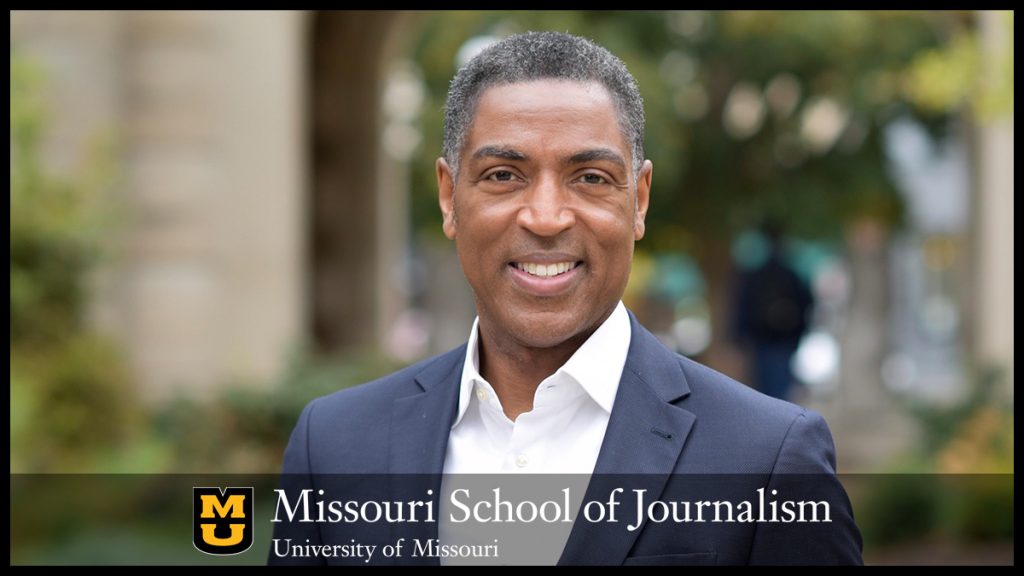Missouri School of Journalism alum Calvin Hughes infuses local journalism with far-reaching implications

By Austin Fitzgerald
Photo by Nate Brown
COLUMBIA, Mo. (Nov. 15, 2024) — Calvin Hughes, BJ ’93, has served as an anchor at Miami’s ABC TV affiliate, WPLG — also known as Local 10 News — for nearly 20 years. He returned to the Missouri School of Journalism in late October to speak with students and touch base at his alma mater, bringing a wealth of experience from a career that, while dedicated to local news, has consistently shown a flair for incorporating national and even international stories in ways that redefine what community journalism can be.
That flair was evident soon after he graduated from the School of Journalism, where he had spent a semester reporting for NPR-member station KBIA-FM. In 1996, while working at KXAS-TV in Dallas, he reported extensively on what became a national story about then-star wide receiver for the Dallas Cowboys, Michael Irvin, who was arrested for cocaine possession.
In fact, Hughes wasn’t sure he wanted to stay in local news when the opportunity to head to WPLG eventually arose; he hoped to land at CNN, or perhaps ABC News. But here again, he found a way to take something “small” and turn it into something far-reaching — in more ways than one.
Sometimes when you’re blessed with a gift and a vision, you have to have something that comes along to sort of anchor you and help to keep your dream afloat. So when you get to the J-School and you see everybody has this dream, and you see people who were born to do it, you’re like, I want that.
Calvin Hughes
“I thought, there’s nothing wrong with staying here for three years and then moving on,” Hughes recalled. “Three years turned out to be 18 going on 19.”
But it only took less than a year at WPLG for Hughes to seize an outsized opportunity. In 2007, when more than 100 Haitian migrants reached Florida after a deadly journey in a rough-hewn sailboat, he made the case for a trip to Haiti to learn more about what was driving migrants to such extremes.
“They told me no,” Hughes said. “And then I had a dream that I was walking down the street in Port-au-Prince — I had never been to Port-au-Prince in my life. The next morning, I told the news director, ‘I don’t want to go to Haiti. I need to go to Haiti.’”
Hughes got his wish, which culminated in Assignment Haiti, a one-hour documentary that became one of the most-watched specials in the station’s history. But it didn’t end there. The connections he forged became essential when he returned to Haiti in 2010 to cover the aftermath of a devastating 7.0 magnitude earthquake, and he returned again and again in the following years, even interviewing presidents. In July of 2021, he filmed an exclusive interview with Haitian First Lady Martine Moïse weeks after the shocking assassination of her husband.
For Miami, a city that roughly 100,000 Haitians call home, Hughes’ coverage of the country has shone a light on economic and social issues that bleed into challenges facing Miami and the larger Florida coast. The continued relevance of such an approach was underlined in June, when, more than 17 years after the events that initially spurred Hughes to travel to Haiti, another sailboat carrying more than 100 Haitian migrants landed off the coast of Key West in strikingly similar circumstances.
Nor was Haiti an isolated circumstance. In 2015, when then-President Barack Obama held a historic meeting with Cuban leader Raúl Castro in an attempt to normalize relations with the country, Hughes was on the first plane. He would go on to cover the death of Fidel Castro and Raúl Castro’s later decision to step down as president, all from inside Cuba.
Anchored at the School of Journalism
“I’m just following the story,” Hughes said. “Instead of trying to control everything, I just say, ‘You know what? I’m going to be led.’ I think if more people did that, they would open themselves up to opportunities that they never even imagined.”
He credits some of that openness to his time at the School of Journalism, where he found the confidence to pursue his chosen vocation.
“No one in my family had ever pursued a career in television or reporting or anything like that,” Hughes said. “Sometimes when you’re blessed with a gift and a vision, you have to have something that comes along to sort of anchor you and help to keep your dream afloat. So when you get to the J-School and you see everybody has this dream, and you see people who were born to do it, you’re like, I want that. I will always be grateful for that.”
During his visit to the School, he hoped to pass some of that wisdom along as he toured KOMU-TV, the School’s NBC affiliate TV station, and met with faculty and students. Of course, he is no stranger to imparting wisdom — in addition to his responsibilities at WPLG, he also serves as a journalism lecturer at the University of Miami. But even so, his alma mater holds a special significance.
“I think I speak on behalf of a lot of alumni that we want to give the school as much as it gave us,” Hughes said. “There is a sense of gratitude and dedication and devotion that we have to the program here that developed us as journalists. I don’t think I’d be where I am right now without the curriculum, the path and passion of the professors here.”
Updated: November 19, 2024